Unveiling Whiteness in the Twenty-First Century
Unveiling Whiteness in the Twenty-First Century
Global Manifestations, Transdisciplinary Interventions
Edited by Veronica Watson, Deirdre Howard-Wagner, Lisa Spanierman
Lexington Books
Lanham Boulder New York London
Published by Lexington Books
An imprint of The Rowman & Littlefield Publishing Group, Inc.
4501 Forbes Boulevard, Suite 200, Lanham, Maryland 20706
www.rowman.com
Unit A, Whitacre Mews, 26-34 Stannary Street, London SE11 4AB
Copyright 2015 by Lexington Books
All rights reserved . No part of this book may be reproduced in any form or by any electronic or mechanical means, including information storage and retrieval systems, without written permission from the publisher, except by a reviewer who may quote passages in a review.
British Library Cataloguing in Publication Information Available
Library of Congress Cataloging-in-Publication Data
Unveiling whiteness in the twenty-first century : global manifestations, transdisciplinary interventions / edited by Veronica Watson, Deirdre Howard-Wagner and Lisa Spanierman.
pages cm
Includes bibliographical references and index.
ISBN 978-0-7391-9296-2 (cloth : alk. paper) ISBN 978-0-7391-9297-9 (electronic) 1. WhitesRace identity. 2. WhitesAttitudes. 3. Women, WhiteRace identity. 4. Racism. I. Watson, Veronica T. II. Howard-Wagner, Deirdre. III. Spanierman, Lisa.
HT1575.U58 2015
305.809dc23
2014040319
 The paper used in this publication meets the minimum requirements of American National Standard for Information SciencesPermanence of Paper for Printed Library Materials, ANSI/NISO Z39.48-1992.
The paper used in this publication meets the minimum requirements of American National Standard for Information SciencesPermanence of Paper for Printed Library Materials, ANSI/NISO Z39.48-1992.
Printed in the United States of America
Dedicated to those who have paved the way,
And those who are yet to come.
We must believe this world can be healed.
Acknowledgments
We owe a great debt to many people who have made this book possible. To our contributors, thank you for your professionalism, responsiveness, and time. This collection would not be in the world without your commitment to the critical work of naming and resisting white supremacy, neocolonialism, and neoliberalism in our contemporary moment.
The editors wish to acknowledge the organizers of the Inter-disciplinary.Net conference that brought us all together in 2011 at Oxford. That meeting was outstanding in its creation of a space where critical conversations about whiteness could happen in a professional environment free of hierarchy and competition. Whatever else the conference accomplished, participants had the opportunity to deeply engage and exchange ideas that could fuel social transformation. For that, we are grateful.
The editors also wish to thank Lexington Books for their commitment to our project, which was never clearer than when they asked us to move up our submission date so that this book could be released earlier. Thank you for your faith in the contribution this book could make.
Finally, we wish to acknowledge our freelance editor, Jane Mackay, for her expertise and ability to work under a difficult timeline. She was truly a partner in this effort and made our work a little less daunting.
Veronica Watson : To my ever-supportive, ever-patient family, again I say you make me possible. Thank you. I would also like to thank Susan Boser and Gloria Park for their continuing intellectual engagement with my work, and to acknowledge the support of the School of Graduate Studies and Research at Indiana University of Pennsylvania.
Lisa B. Spanierman : I am grateful to D. Anthony Clark and Helen Neville for their neverending wellspring of support and encouragement and for discussing countless ideas related to unveiling whiteness. I want to express gratitude to all my mentors in critical whiteness and to the participants at the First Global Conference on Whiteness, whose work inspired this collection. I also would like to acknowledge the support of the School of Letters and Sciences at Arizona State University.
Deirdre Howard-Wagner: I dedicate my work in this collection to my daughter, Indira Wagner.
I wish to thank my husband Rendall Wagner for his understanding, love, and support throughout this process.
I am grateful to Veronica Watson and Lisa Spanierman for their intellectual support, friendship, and encouragement during the production of this collection. My gratitude also to Daphne Habibis, Theresa Petray, Lynette Riley, Janet Mooney, Vicki Grieves, and Jane Durie for their conversations over the years about critical race and whiteness studies. I also wish to acknowledge the support of the Department of Sociology and Social Policy at the University of Sydney.
Introduction
Veronica Watson, Deirdre Howard-Wagner, and Lisa Spanierman
In July 2011 over fifty scholars from institutions across the globe gathered at Oxford University for the 1st Global Conference: Images of Whiteness, Exploring Critical Issues organized by Inter-disciplinary.Net . Over the course of four days we lived and dined together, collaborated and challenged each other to deeper consideration of the various contexts and approaches that fueled our interrogations of whiteness. As a result of finding a supportive community in which to pursue our work, we continued to exchange ideas, to query the work we were doing, and to consider new avenues of collaborative research. We wanted to better understand and resist the constructs of repressive, exploitative whiteness in our various national contexts, professional and educational locations, and as part of our personal critical praxes. For the three of us who came together to co-edit this volume, this was particularly true, and we sought contributors with whom to continue the important transnational and multidisciplinary exchanges and interventions we had started at Oxford. This book is the continuation and extension of those conversations.
What was most promising about the Images of Whiteness conference was the multidisciplinary, multigenerational, multinational nature of the gathering. The range of fields represented there encouraged participants to think across disciplines and to pursue and interrogate our work within larger intellectual frameworks. The co-editors worked to preserve the energy and synergism of that model in this collection. Unveiling Whiteness in the 21st Century draws from the fields of African American Studies, Education, English Studies, Media Studies, Philosophy, Political Science, Psychology, Sociology and Womens Studies. The analyses grew out of empirical research as well as more humanistic inquiries, and scholars from a wide range of professional and educational paths are represented. Continuing our collaborations from the conference, we encouraged authors to think about their work in and through the contributions of others in this collection. In this more focused volume in which contributors had the opportunity to develop their theoretical and conceptual understandings through engagement with the ideas and work of scholars from different disciplines, we found that the work of psychologists, political scientists, sociologists, and feminist scholars really did complicate our analyses of whiteness in productive ways. The result is that chapters in each section, and across the sections, speak to and through each other, deepening the engagement of each and providing multiple perspectives to a number of recurring themes in the book. This cross-fertilization constitutes the transdisciplinarity of our title and collection.
This book builds on the long, rich tradition of intellectual work on whiteness that renders whiteness visible, a marking that is a necessary precursor to dismantling it. Scholars and intellectuals like W.E.B. Du Bois (1903, 1935), Toni Morrison (1992), Ruth Frankenberg (1993, 1997), George Lipsitz (2006), Joe Feagin (2013), David Roediger (1991, 2008), and section writer for Part I of this collection, Melissa Steyn (2001), to name but a few, have laid the foundation upon which we explore the oppressive constructions of whiteness as a racial and social identity historically as well as into our contemporary moment. These scholars have provided critical approaches that have exposed whiteness as a social construction and contested identity, and demonstrated the ways that whiteness seduces and rewards, becoming the subject of fantasy and desire. Their work has explored the reproduction and justification of whiteness through national policies and literatures and the ways that white violence is naturalized and made invisible in the world. Focusing on the work of African American intellectuals, Veronica Watson (2008, 2011, 2014) continues the exploration of the vexed and troubling maneuvers of whiteness to maintain dominance in the multicultural United States. In this collection, this work is continued by scholars who are seeking to disrupt whiteness through a similar attention to discourse, language, and the psychological and structural mechanisms that both enable the reproduction of and reveal the irreconcilable schisms within whiteness.
Next page
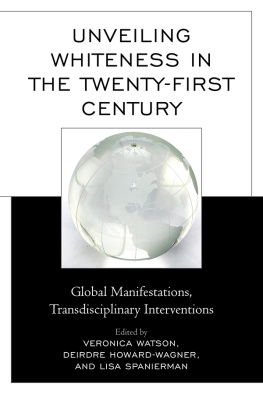

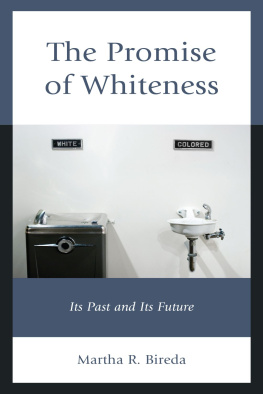
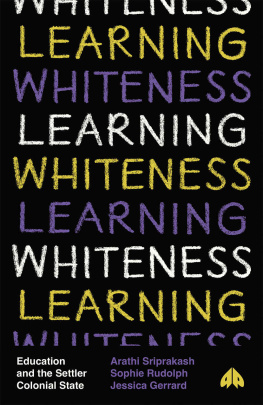
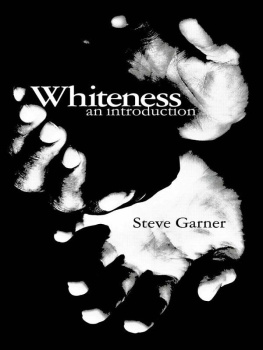
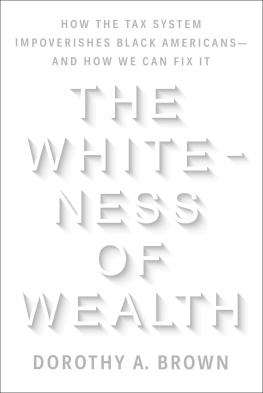

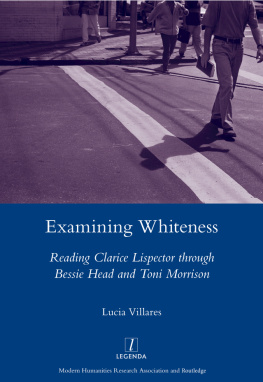
 The paper used in this publication meets the minimum requirements of American National Standard for Information SciencesPermanence of Paper for Printed Library Materials, ANSI/NISO Z39.48-1992.
The paper used in this publication meets the minimum requirements of American National Standard for Information SciencesPermanence of Paper for Printed Library Materials, ANSI/NISO Z39.48-1992.